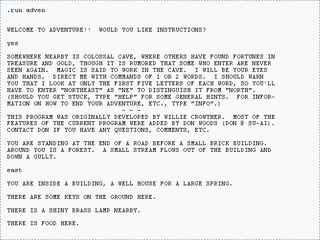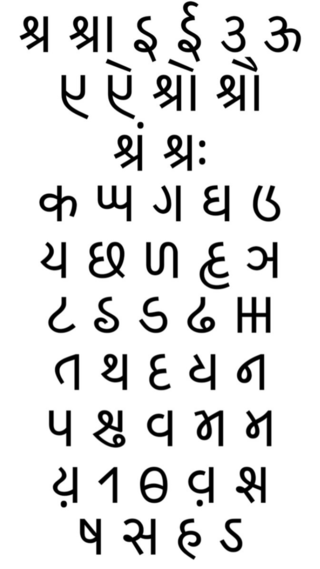Related Research Articles

A look-alike, double, or doppelgänger is a person who bears a strong physical resemblance to another person, excluding cases like twins and other instances of family resemblance.

A Creative Commons (CC) license is one of several public copyright licenses that enable the free distribution of an otherwise copyrighted "work". A CC license is used when an author wants to give other people the right to share, use, and build upon a work that the author has created. CC provides an author flexibility and protects the people who use or redistribute an author's work from concerns of copyright infringement as long as they abide by the conditions that are specified in the license by which the author distributes the work.

Colossal Cave Adventure is a text-based adventure game, released in 1976 by developer Will Crowther for the PDP-10 mainframe computer. It was expanded upon in 1977 by Don Woods. In the game, the player explores a cave system rumored to be filled with treasure and gold. The game is composed of dozens of locations, and the player moves between these locations and interacts with objects in them by typing one- or two-word commands which are interpreted by the game's natural language input system. The program acts as a narrator, describing the player's location and the results of the player's attempted actions. It is the first well-known example of interactive fiction, as well as the first well-known adventure game, for which it was also the namesake.

Share-alike (🄎) is a copyright licensing term, originally used by the Creative Commons project, to describe works or licenses that require copies or adaptations of the work to be released under the same or similar license as the original. Copyleft licenses are free content or free software licenses with a share-alike condition.

Wookieepedia: The Star Wars Wiki is an online encyclopedia for information about the Star Wars universe—including information on all the films, the books, as well as Clone Wars, The Clone Wars and its introductory film, Rebels, the Star Wars Expanded Universe, and any upcoming Star Wars material. It is a wiki focused on the Star Wars universe with some articles reaching up to 60,000 words, and is written almost entirely from an in-universe perspective. The name is a portmanteau of Wookiee and encyclopedia, a pun on the name of Wikipedia. The logo, too, is a visual pun showing the incomplete second Death Star as opposed to Wikipedia's incomplete "jigsaw logo".
A sound-alike is a recording intended to imitate the sound of a popular record, the style of a popular recording artist, or a current musical trend; the term also refers to the artists who perform on such recordings. In the voice-over world, it may also refer to those who recreate the voice and vocal mannerisms of a given celebrity's vocal performance.
A scraper site is a website that copies content from other websites using web scraping. The content is then mirrored with the goal of creating revenue, usually through advertising and sometimes by selling user data.

Kaithi, also called Kayathi or Kayasthi, is a historical Brahmic script that was used widely in parts of Northern and Eastern India, primarily in the present-day states of Uttar Pradesh, Jharkhand and Bihar. In particular, it was used for writing legal, administrative and private records. It was used for a variety of Indo-Aryan languages, including Awadhi, Bhojpuri, Hindustani, Magahi, and Nagpuri.

Carl Johan Schönherr was a Swedish entomologist who revised the taxonomy of beetles, including weevils.
Wikimapia is a geographic online encyclopedia project. The project implements an interactive "clickable" web map that utilizes Google Maps with a geographically-referenced wiki system, with the aim to mark and describe all geographical objects in the world.

Wikivoyage is a free web-based travel guide for travel destinations and travel topics written by volunteer authors. It is a sister project of Wikipedia and supported and hosted by the same non-profit Wikimedia Foundation (WMF). Wikivoyage has been called the "Wikipedia of travel guides".
Drew's Entertainment, also known as TUTM Entertainment, Inc., located in Greenbrook, New Jersey, is a record label company that produces sound-alike and cover versions of songs. Their music compilations have sold over 40 million copies since 1994.

Tux is a penguin character and the official brand character of the Linux kernel. Originally created as an entry to a Linux logo competition, Tux is the most commonly used icon for Linux, although different Linux distributions depict Tux in various styles. The character is used in many other Linux programs and as a general symbol of Linux.

Copyleft is the legal technique of granting certain freedoms over copies of copyrighted works with the requirement that the same rights be preserved in derivative works. In this sense, freedoms refers to the use of the work for any purpose, and the ability to modify, copy, share, and redistribute the work, with or without a fee. Licenses which implement copyleft can be used to maintain copyright conditions for works ranging from computer software, to documents, art, scientific discoveries and even certain patents.

The GNU Free Documentation License is a copyleft license for free documentation, designed by the Free Software Foundation (FSF) for the GNU Project. It is similar to the GNU General Public License, giving readers the rights to copy, redistribute, and modify a work and requires all copies and derivatives to be available under the same license. Copies may also be sold commercially, but, if produced in larger quantities, the original document or source code must be made available to the work's recipient.

MIT App Inventor is a high-level block-based visual programming language, originally built by Google and now maintained by the Massachusetts Institute of Technology. It allows newcomers to create computer applications for two operating systems: Android and iOS, which, as of 25 September 2023, is in beta testing. It is free and open-source released under dual licensing: a Creative Commons Attribution ShareAlike 3.0 Unported license and an Apache License 2.0 for the source code. Its target is primarily children and students studying computer programming, similar to Scratch.
A share icon is a user interface icon intended to convey to the user a button for performing a share action. Content platforms such as YouTube often include a share icon so that users can forward the content onto social media platforms or embed videos into their websites, thus increasing its view count.

The Chinese button knot is essentially a knife lanyard knot where the lanyard loop is shortened to a minimum, i.e. tightened to the knot itself. There emerges therefore only two lines next to each other from the knot: the beginning and the end. The knot has traditionally been used as a button on clothes in Asia, thus the name.
The Chinese Button Knot is worn throughout China on underwear and night clothes. Buttons of this sort are more comfortable to lie on and to rest against compared to common bone and composition buttons, and they cannot be broken even by the laundry.
A Chinese tailor ties the knot without guide, flat on his table. But one may be more quickly and easily tied in hand by a modification of the sailor’s method of tying his knife lanyard knot (#787). The two knots are tied alike, but they are worked differently.
Ximera is a massive open online course by Ohio State University on Coursera and YouTube. The system was originally known as MOOCulus and Calculus One.
References
As of this edit, this article uses content from "synonymia" , which is licensed in a way that permits reuse under the Creative Commons Attribution-ShareAlike 3.0 Unported License, but not under the GFDL. All relevant terms must be followed.